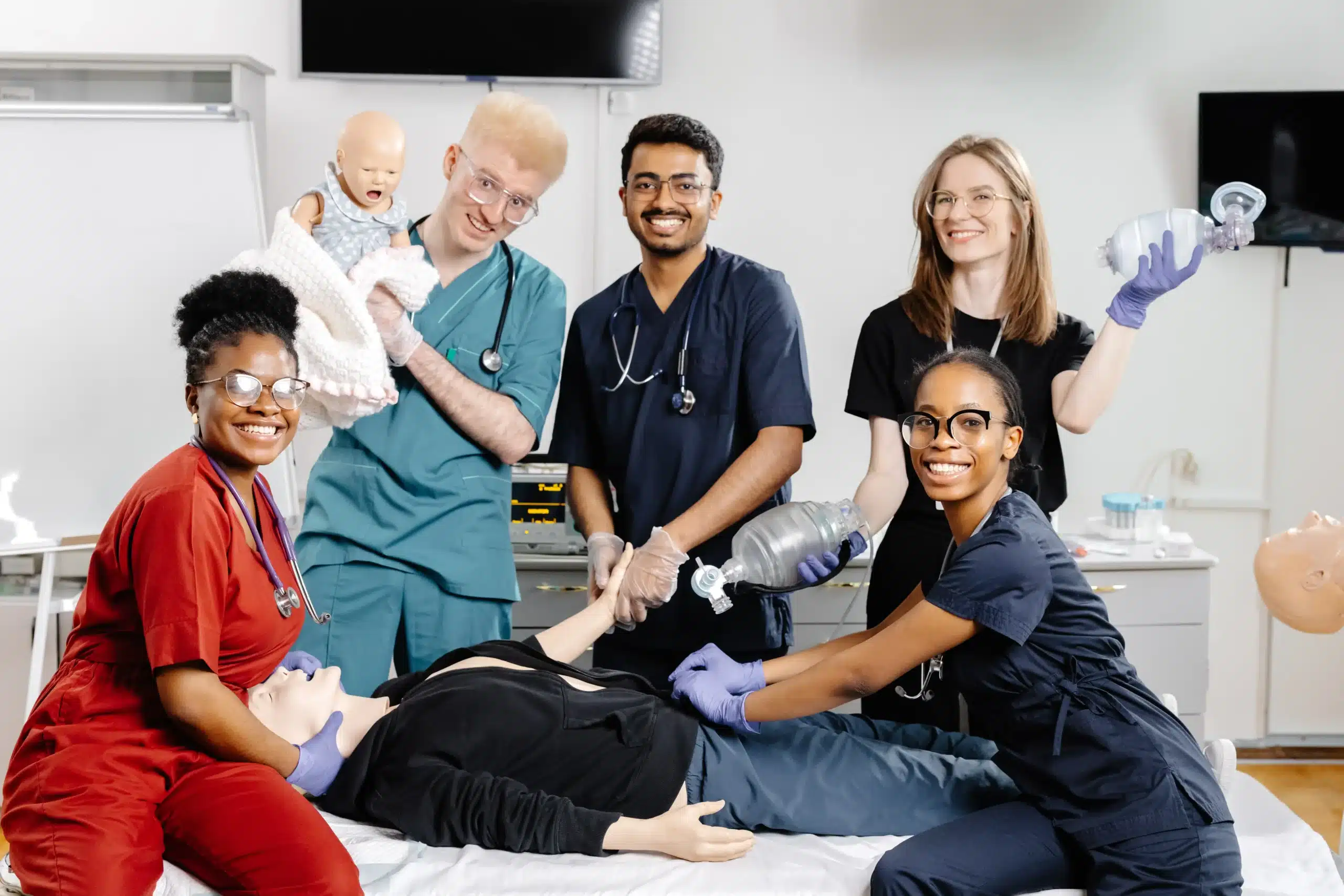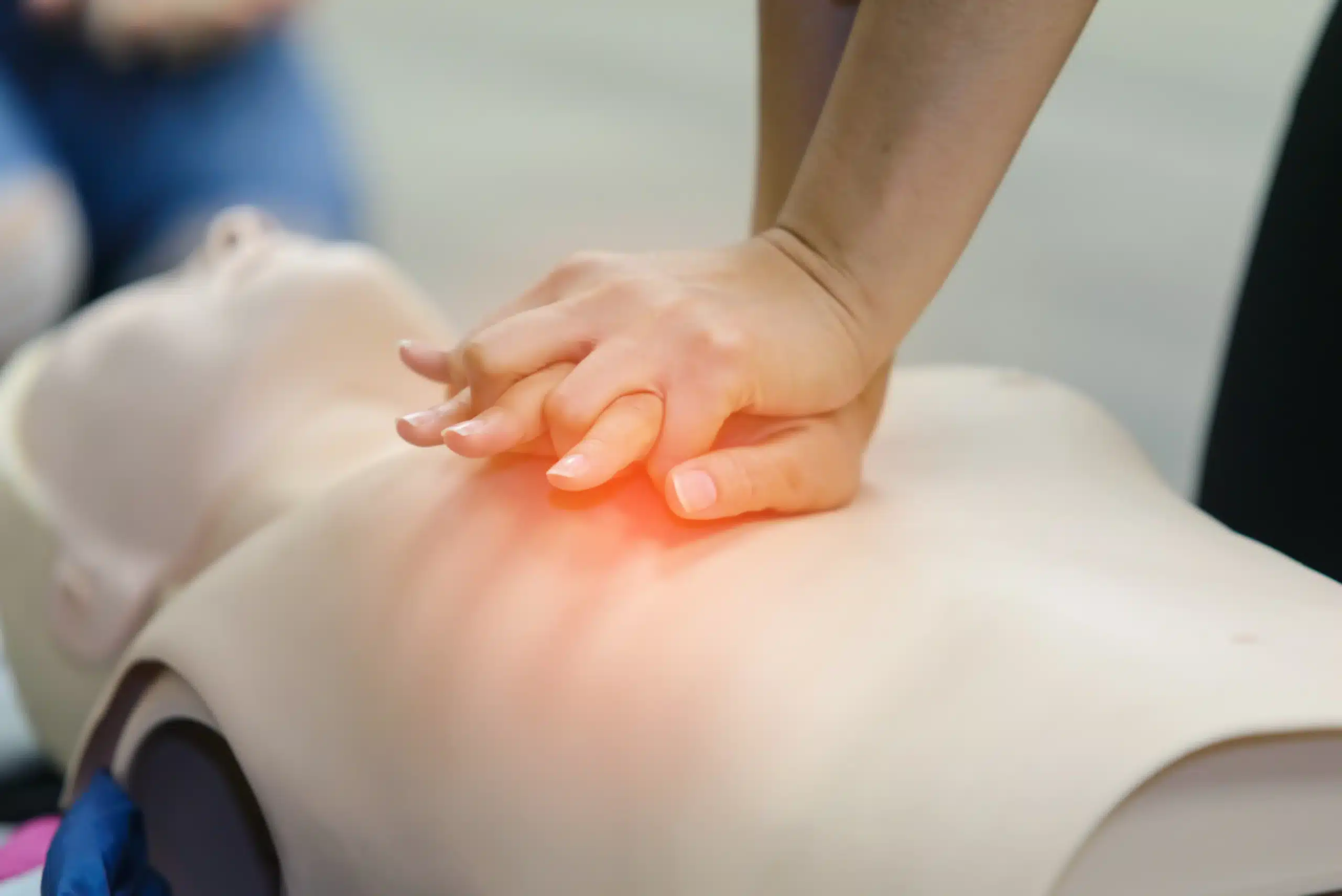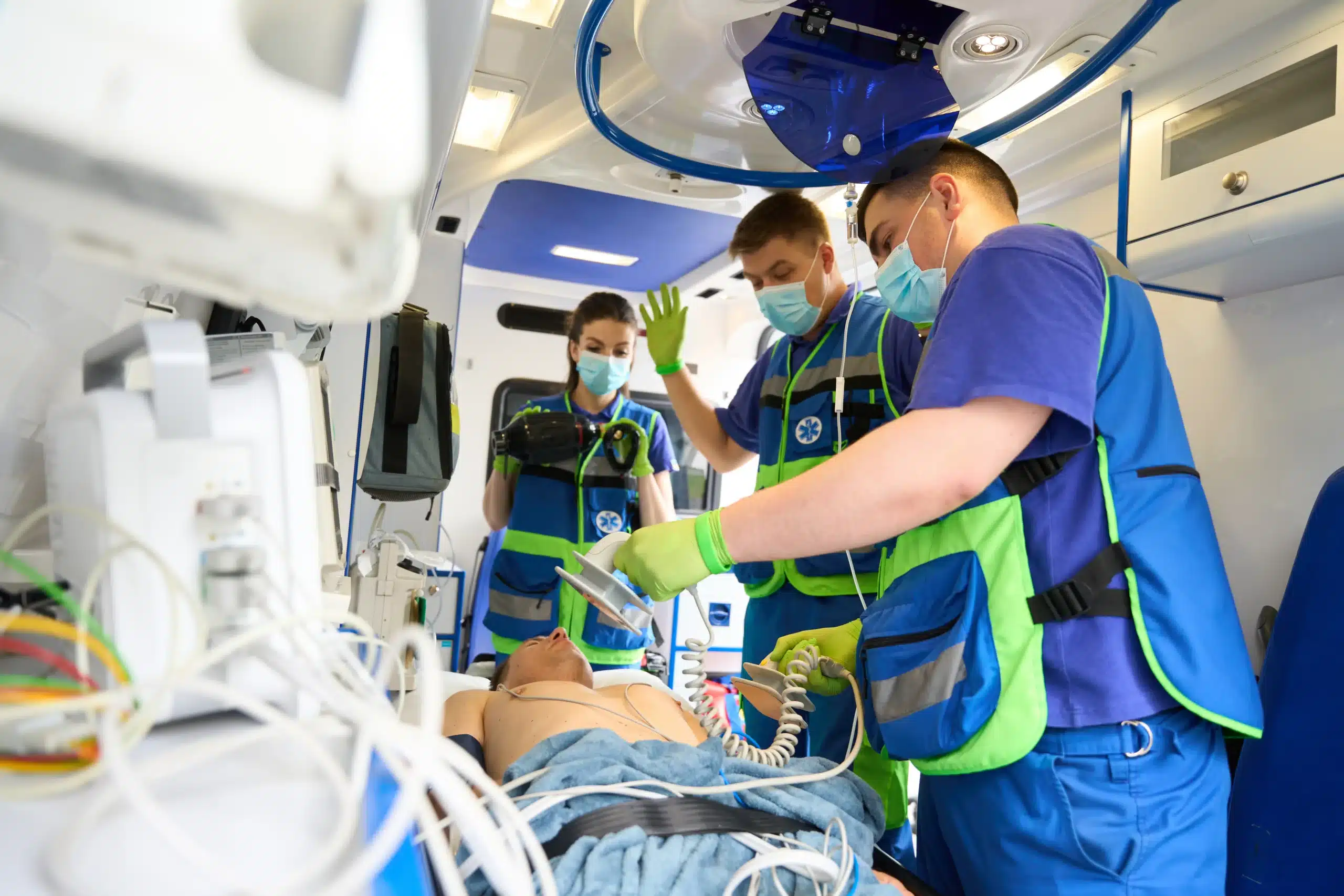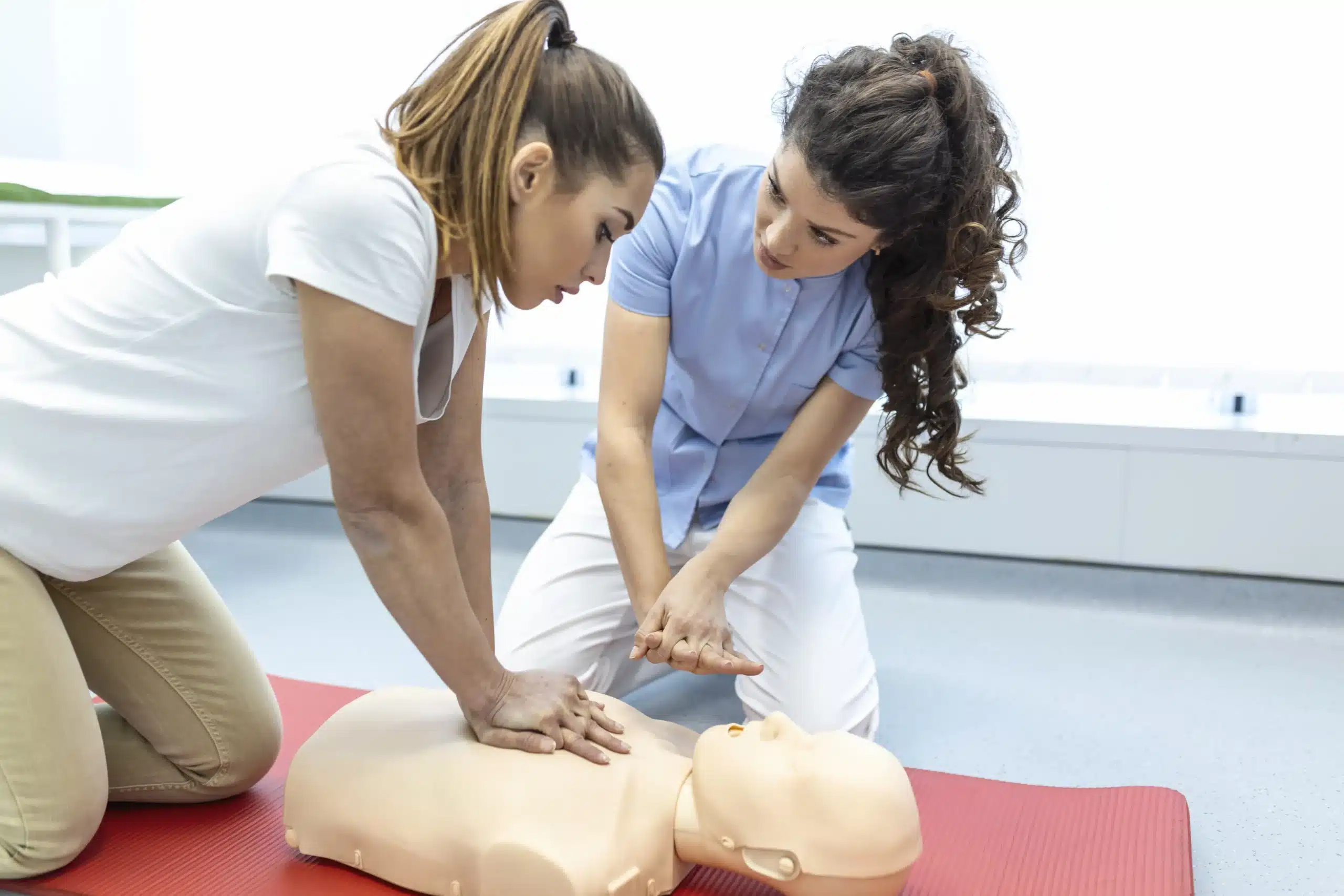Balancing work, life, and continuing education can be a real juggling act for healthcare providers. If you’re looking for a flexible and effective way to get ACLS certified in San Rafael, HeartCode ACLS might be the perfect solution. This blended learning program allows you to complete the coursework online at your own pace, followed by a hands-on skills session to solidify your knowledge. This article will explore the ins and outs of HeartCode ACLS, providing a comprehensive guide to earning your ACLS Heartcode in San Rafael. We’ll cover the program’s structure, benefits, cost, and scheduling options, as well as answer frequently asked questions to help you prepare for your training.
Key Takeaways
- HeartCode ACLS blends online learning with hands-on skills: This flexible approach lets you learn at your own pace and then demonstrate your skills in person, making certification more convenient.
- San Rafael CPR Classes offers comprehensive, affordable training: They provide HeartCode ACLS, following the latest AHA guidelines, with a low price guarantee, making them a great local resource.
- Maintaining your ACLS certification is essential: Regularly renew your credentials to stay up-to-date and provide the best possible patient care. Consider the RQI program for a streamlined renewal process.
What is HeartCode ACLS?
HeartCode ACLS Explained
HeartCode ACLS is a self-paced, online course that uses adaptive learning technology. This means the program adjusts to your learning style, providing a personalized experience. It focuses on building essential skills for medical professionals, covering effective team dynamics, clear communication strategies, and advanced airway management techniques. The flexibility of online learning allows you to complete the coursework on your own schedule, from anywhere with an internet connection.
Key Features and Benefits
This American Heart Association (AHA) course reflects the latest science in cardiopulmonary resuscitation (CPR) and emergency cardiovascular care (ECC) based on the 2020 AHA Guidelines. It also incorporates updates from the 2019 update to the 2018 American Stroke Association (ASA) Ischemic Stroke Guidelines. The ACLS course emphasizes preventing cardiac arrest, building high-performance teams, delivering continuous high-quality CPR, and understanding systems of care. You’ll also work through various case studies to apply your knowledge in realistic scenarios, preparing you to confidently manage complex cardiovascular emergencies.
HeartCode vs. Traditional ACLS
HeartCode blended learning, offered by the AHA, provides flexible resuscitation training options. Compared to traditional classroom settings, HeartCode BLS, ACLS, and PALS courses offer healthcare organizations a more efficient way to train numerous students, regardless of their location or specific care setting. This blended learning approach combines the convenience of online learning with the essential hands-on skills practice required for certification. This makes it a practical choice for busy professionals and organizations seeking adaptable training solutions.
How Does HeartCode ACLS Work in San Rafael?
This section explains how the blended learning approach of HeartCode ACLS seamlessly integrates online learning with practical skills assessment. It’s designed to equip healthcare providers in San Rafael with the knowledge and expertise to manage cardiovascular emergencies effectively.
Online Component Overview
The HeartCode ACLS course begins with a self-paced online component, reflecting the latest science in the 2020 American Heart Association (AHA) Guidelines for CPR and ECC. This portion allows you to work through interactive case simulations, learn megacode scenarios, and test your knowledge. Expect to spend about three to four hours completing the online modules. The self-paced format allows you to fit the training into your schedule. Once you finish the online portion, you’ll receive a completion certificate, which is required to schedule your in-person skills assessment. Learn more about our ACLS courses.
In-Person Skills Assessment
After completing the online training, you’ll move on to the hands-on skills assessment at our San Rafael training center. This session typically takes about 40 minutes. During the assessment, you’ll demonstrate the practical application of the skills you learned online, including bag-mask ventilation, ECG rhythm recognition, and administering medications. A certified instructor will provide real-time feedback and guidance, ensuring you’re prepared to handle real-life emergencies. This in-person component is essential for mastering the psychomotor skills necessary for effective patient care.
Blended Learning Advantages
The HeartCode blended learning format offers several advantages for busy healthcare professionals. It combines online learning with the hands-on practice required for ACLS certification. This flexible approach helps you manage your time effectively. The blended learning model also provides high-quality resuscitation training, ensuring you receive the same comprehensive education as traditional classroom-based courses. Explore the benefits of AHA HeartCode training. This combination of online learning and in-person skills sessions makes HeartCode ACLS an effective and efficient way to get certified or recertified.
HeartCode ACLS: Cost & Schedule in San Rafael
This section covers cost and schedule details for HeartCode ACLS certification in San Rafael, making it easier for you to plan your training.
Pricing Breakdown
The cost for HeartCode ACLS certification in San Rafael is $290. This covers the online portion, the required in-person skills testing, and your official ACLS certification card. San Rafael CPR Classes offers a low price guarantee, ensuring you receive excellent value.
Class Schedule & Duration
San Rafael CPR Classes offers convenient class times, seven days a week, between 7 am and 6 pm. The HeartCode ACLS course combines online learning with a hands-on skills session. The online component typically takes 3–4 hours to complete, and the in-person skills test takes approximately 40 minutes. This blended learning approach allows you to learn at your own pace and then demonstrate your skills. For more information, visit their ACLS course page.
Flexible Learning Options
One of the key advantages of HeartCode ACLS is its flexibility. The online portion allows you to study anytime, anywhere. Whether you prefer short study sessions or longer blocks of time, you’re in control. Heart Start CPR also offers fully online and blended learning options (online plus in-person skills) for their AHA HeartCode ACLS certification, providing choices to suit your learning style.
Get ACLS Certified: Process & Validity
Initial Certification Steps
The ACLS classes offered by the American Heart Association in San Rafael are designed to accommodate healthcare providers at all career stages. Whether you’re a medical student, nurse, or experienced physician, the process begins with completing the required ACLS coursework. This involves learning the core algorithms for managing cardiac arrest, stroke, and other cardiovascular emergencies. Topics covered include airway management, rhythm recognition, and pharmacology. After the coursework, you’ll demonstrate your skills in a hands-on exam. Successful completion of both components earns you your initial ACLS certification.
Recertification Options
Maintaining your ACLS certification is crucial for providing safe and effective patient care. Healthcare professionals can choose from various recertification options, including in-person courses, online courses with skills sessions, or blended learning that combines online learning with hands-on training. This flexibility allows you to select the format that best fits your schedule and learning preferences. Remember to recertify before your current certification expires to avoid a lapse in your credentials.
Maintain Your ACLS Credentials
Beyond initial certification and recertification, staying current with the latest resuscitation guidelines is essential. The American Heart Association RQI program offers a convenient and efficient way to maintain your ACLS credentials. This program uses a blended learning approach, combining online modules with short, frequent skills sessions. RQI reinforces your knowledge and skills, ensuring you’re always prepared to respond to a cardiac emergency. It’s a valuable tool for healthcare professionals seeking a streamlined and effective way to stay current with their ACLS certification.
Prepare for Your HeartCode ACLS Course
Getting ready for your HeartCode ACLS course can make a real difference in your overall experience. This section covers everything you need to know beforehand, from required materials to helpful study tips.
Required Materials & Prerequisites
The HeartCode ACLS course blends online learning with a hands-on skills session. You’ll start with the HeartCode ACLS online portion, which you can complete at your own pace. This part covers essential ACLS principles, including the importance of high-performance teams and high-quality CPR, as described in this HeartCode® ACLS overview. After finishing the online modules, you’ll schedule an in-person skills check with an AHA Instructor to demonstrate your proficiency. Check with your chosen provider, like San Rafael CPR Classes, for their specific requirements.
Tips for Success
A little preparation goes a long way. Before starting your HeartCode ACLS training, review the current American Heart Association guidelines. You can find helpful resources and practice scenarios online. Consider forming a study group to reinforce your knowledge and share tips. The self-paced online portion offers flexibility, allowing you to fit your studies around your schedule. For more advice on refreshing your skills, check out this ACLS renewal guide.
Overcome Common Challenges
One common concern is whether online learning is as effective as traditional classroom instruction. Many providers offer online ACLS courses that meet the same rigorous standards as in-person classes. These courses allow you to learn the updated content, discuss your experiences with peers, and refine your skills. If you’re looking for a streamlined approach to certification, the RQI program might be a good fit for medical professionals seeking a fast and efficient path to their AHA certification cards.
Top HeartCode ACLS Providers in San Rafael
Finding the right HeartCode ACLS training provider is crucial for a positive learning experience. Here are a few reputable options in the San Rafael area:
San Rafael CPR Classes
San Rafael CPR Classes offers comprehensive training, including American Heart Association ACLS. They focus on providing high-quality instruction and flexible scheduling to accommodate busy healthcare professionals. Their commitment to adhering to the latest AHA guidelines ensures students receive up-to-date training. Serving San Rafael, Corte Madera, and Fairfax, they are a convenient local option for RQI classes. They also offer a low price guarantee.
Heart Start CPR
Heart Start CPR is known for its positive student reviews and supportive learning environment. They offer a range of courses, including BLS, ACLS, and PALS, taught by experienced instructors. If you value a strong learning community and personalized instruction, Heart Start CPR might be a good fit.
Cascade Training Solutions
Cascade Training Solutions emphasizes the importance of staying current with the latest guidelines. They offer online ACLS recertification courses that allow healthcare providers to conveniently renew their credentials. Their focus on updated content and peer-to-peer learning makes them a valuable resource for practicing professionals.
Bay Area CPR
Bay Area CPR provides AHA-certified courses in BLS, ACLS, PALS, First-aid, and CPR in San Rafael. Their focus on accessibility and offering courses throughout the Bay Area makes them a practical choice for those seeking convenient training.
Choosing the Right Provider
With several options available, selecting the right HeartCode ACLS provider depends on your individual needs. Consider factors like course format (online, blended, or in-person), scheduling flexibility, instructor experience, and overall cost. Providers like AMRI, mentioned in this guide to ACLS renewal in Fairfax, offer nationally accredited online options, which can be a good choice for busy professionals. Do your research and choose a provider that aligns with your learning style and professional goals. You can also find additional resources in this Northern California CPR directory.
HeartCode ACLS: Participant Feedback
Hearing from others who have completed the course can be incredibly helpful. Here’s a glimpse into what participants are saying about HeartCode ACLS programs in San Rafael:
Course Content & Structure
The American Heart Association designs its ACLS courses to meet the needs of healthcare providers at all career stages. The blended learning format of HeartCode ACLS combines online modules with in-person skills sessions, offering flexibility and thoroughness. This structure allows you to learn the core material at your own pace and then demonstrate your skills in a practical setting.
Instructor Quality & Support
Positive instructor experiences are essential for successful learning. Reviews often mention the quality of the instructors, emphasizing their expertise and supportive approach. Heart Start CPR showcases testimonials that praise instructors for creating a comfortable and encouraging learning environment. This feedback indicates that instructors focus not only on delivering information but also on fostering a positive learning experience.
Overall Satisfaction & Outcomes
The success of an ACLS course ultimately depends on participant satisfaction and improved patient care. These programs play a vital role in enhancing emergency cardiovascular care in San Rafael. Participants value the chance to refresh their knowledge and skills, particularly through ACLS renewal courses, where they can discuss updates and best practices with colleagues. This collaborative learning strengthens the overall experience and reinforces the importance of staying up-to-date in the field.
HeartCode ACLS FAQs
Got questions about the HeartCode ACLS process? We’ve got answers! This FAQ covers common questions about the program, from what it is to how it works.
What is HeartCode ACLS?
HeartCode ACLS is a blended learning course that combines online coursework with a hands-on skills session. This flexible format allows you to complete the theoretical part at your own pace before demonstrating your skills in person. You’ll study key algorithms, interventions, and effective team dynamics for managing cardiopulmonary arrests and other cardiovascular emergencies. For a comprehensive overview, take a look at this helpful HeartCode ACLS guide.
How long is the ACLS certification valid?
Your ACLS certification earned through the HeartCode program is valid for two years. To maintain your credentials and stay current on the latest guidelines, you’ll need to complete an ACLS renewal course before it expires.
What topics does the course cover?
The HeartCode ACLS course covers essential topics, including Basic Life Support (BLS) principles, advanced cardiac life support techniques, and how to use a defibrillator. You’ll also learn about different systems of care and work through various case studies to build your knowledge and decision-making skills. Learn more about the ACLS course content.
How is the skills test conducted?
After completing the online portion, you’ll schedule an in-person skills session. The skills test involves a computerized mannequin, allowing you to practice real-world scenarios in a safe environment. While an instructor won’t be physically present during the test itself, support is available by phone if needed. San Rafael CPR training offers this convenient testing format.
What are my options for recertification?
When it’s time to renew, you have several options. You can choose from in-person courses, online courses with skills sessions, or blended learning courses similar to your initial HeartCode training. Explore different ACLS renewal options to find the best fit for your schedule and learning style.
What is the RQI program?
The American Heart Association RQI (Resuscitation Quality Improvement) program offers a streamlined and efficient path to maintaining your certification. RQI helps healthcare professionals keep their skills sharp through low-dose, high-frequency practice and assessment. Learn more about the RQI program for BLS, ACLS, and PALS certification.
Related Articles
- PALS HeartCode Corte Madera: Online & Skills Session – San Rafael CPR Classes
- HeartCode BLS in Corte Madera: Your Complete Guide – San Rafael CPR Classes
- Online ACLS Classes in Fairfax: Your Complete Guide – San Rafael CPR Classes
- AHA ACLS Classes in San Rafael, CA – San Rafael CPR Classes
- ACLS Renewal in Fairfax: Your Complete Guide – San Rafael CPR Classes
Frequently Asked Questions
What if I don’t have consistent internet access to complete the online portion of HeartCode ACLS?
While the online portion is self-paced, reliable internet access is necessary. If you lack consistent access at home or work, consider using public resources like libraries or contacting San Rafael CPR Classes to discuss potential solutions. They might be able to offer alternative arrangements to ensure you can complete the online modules.
I’m already certified in BLS. Do I need to retake it as part of the HeartCode ACLS course?
A current BLS certification is a prerequisite for ACLS. If your BLS certification is still valid, you won’t need to retake it. However, if it’s expired or about to expire, it’s a good idea to renew it concurrently with your ACLS training.
Is HeartCode ACLS accepted everywhere?
Yes, HeartCode ACLS is an official American Heart Association course and the certification is widely accepted. It meets the same standards as traditional classroom-based ACLS training.
I’m nervous about the skills test. What if I don’t pass?
The skills test is designed to assess your practical application of the knowledge you gained online. The instructors at San Rafael CPR Classes are supportive and provide feedback to help you succeed. If you don’t pass the first time, you can typically retest after some additional practice.
What’s the difference between ACLS and PALS?
While both courses cover life-saving techniques, ACLS (Advanced Cardiovascular Life Support) focuses on adult patients, while PALS (Pediatric Advanced Life Support) focuses on infants and children. The specific techniques and algorithms differ based on the patient’s age and developmental stage. If you work with both adults and children, you might need both certifications.






